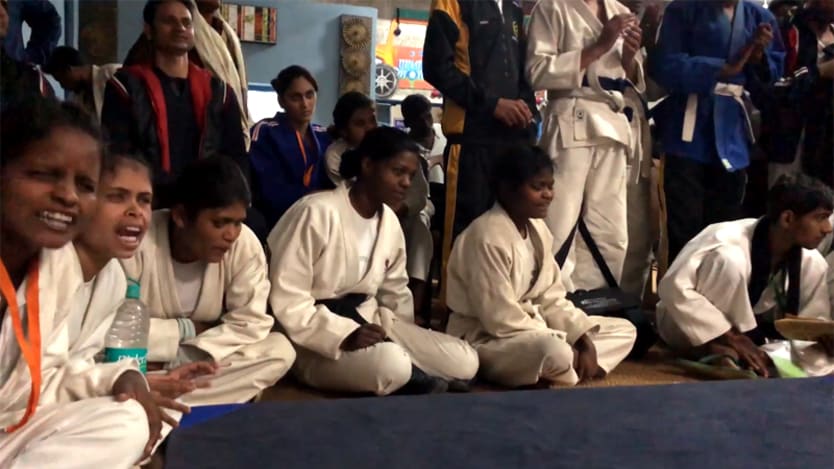
BARCELONA — Classes in self-defense, computer training, and beekeeping in lower- and middle-income countries show how training can help people with visual impairments gain employment, boost self-esteem, and enhance inclusion, NGO representatives have said.
Development programs tackling vision should consider implementing skills-based training, said Archana Bhambal, area director of North India at Sightsavers — an NGO working to treat and prevent avoidable blindness, and promote equality for people with visual impairments and other disabilities.
“As they get economic status within the community, their self-esteem starts building and then instead of focusing on their disability, other people start to realize the abilities of people with visual impairment.”
— Ojok Simon, CEO, HIVE UgandaBy providing opportunities to learn new skills, organizations can create an “empowerment and inclusion strategy” that can help those with a visual impairment, Bhambal added.
“They get a lot of exposure, a lot of learning, they meet people, they're able to experience things and get a chance to interact with other persons of disability. I would definitely recommend other organizations working with persons living with a disability to ... take this up,” Bhambal said, pointing to self-defense and judo classes Sightsavers created in collaboration with the Madhya Pradesh police department in India as an example.
The program was started after women and girls with poor vision in Madhya Pradesh reported being targets of harassment or violence. “These girls would tell us about instances when people see them traveling on trains and buses and try to take advantage,” Bhambal said. According to a survey by the Thomson Reuters Foundation, India is the world’s most dangerous country for women.
“When self-defense was taught to them, we saw a dramatic change in their confidence levels and body postures improved,” said Bhambal, adding that the social inclusion program is being rolled out in other districts too.
The self-defense class evolved to include judo training and now more than 50 women have taken part in sessions. Some have even competed in the national blind and deaf judo championships, while others now earn an income from the skills by working as trainers.
“This is a great way a girl can actually demonstrate that they are an equal part of society and can contribute equally,” Bhambal said, adding that women without poor vision have also begun to take part. “In most of the households, these girls have to work — they go and fetch water for their homes, they have to cook at home, they have to clean — so it's a difficult life for them.”
Realizing their abilities
HIVE Uganda is another NGO offering a different type of training. The northern-Uganda-based organization promotes the participation of rural people living with a visual impairment through beekeeping, and other classes such as marketing, human rights, and democracy.
“This training gives them knowledge and skills so they can improve their livelihoods and challenge the status quo,” said Ojok Simon, CEO at HIVE Uganda. “As they get economic status within the community, their self-esteem starts building and then instead of focusing on their disability, other people start to realize the abilities of people with visual impairment.”
In a country where 60% of the population relies on agriculture for their livelihood, this project seeks to ensure that those with a visual impairment don’t get left behind. In addition to the training, it provides each participant with five beehives.
► How India became a leader in low-cost, high-quality eye care
► In Ethiopia, a multipronged approach to tackle avoidable blindness
Success for some individuals has gone beyond the initial training. According to Simon, some participants have been elected as community leaders, citing their abilities to “challenge the status quo, articulate issues concerning health, and address the needs of the vulnerable,” as reasons behind their nominations.
“This training can enhance their ability to speak to the people and speak up about their challenges for people to become aware,” Simon said.
ATRIEV in the Philippines, a nonprofit organization that offers computer training for people living with poor vision, seeks to improve the lives of the blind and visually impaired. The school was created in partnership with Microsoft Philippines, CBM Asia South East, the NORFIL Foundation, Ateneo de Manila University, CBM Livelihood Cluster, and other national government agencies.
Students who have received training, which includes a registration fee, have gone on to find employment as virtual assistants, online content writers, transcriptionists, and software analysts.
“A number of persons living with poor vision in the Philippines are no longer a subject of charity and pity, but a contributor to economic, social and political advancement, playing a role for national growth and development and are taxpayers,” Tony Llanes, executive director at ATRIEV, said in an email, urging that this type of training should be implemented at the local and global level.
Bhambal urged groups looking to implement inclusion programs to take time to ask the people they’re serving what they actually need and want, Bhambal said. “Start with a good interaction with [people living with vision impairments] and then plan a strategy.” For example, after getting feedback, Sightsavers expanded its self-defense training classes to now include yoga and meditation.
The next step is then to find people to run the various activities with the necessary adaptation for the group being targeted. “This is an excellent way of making sure that inclusion happens and the empowerment of persons with disability happens,” Bhambal said.
